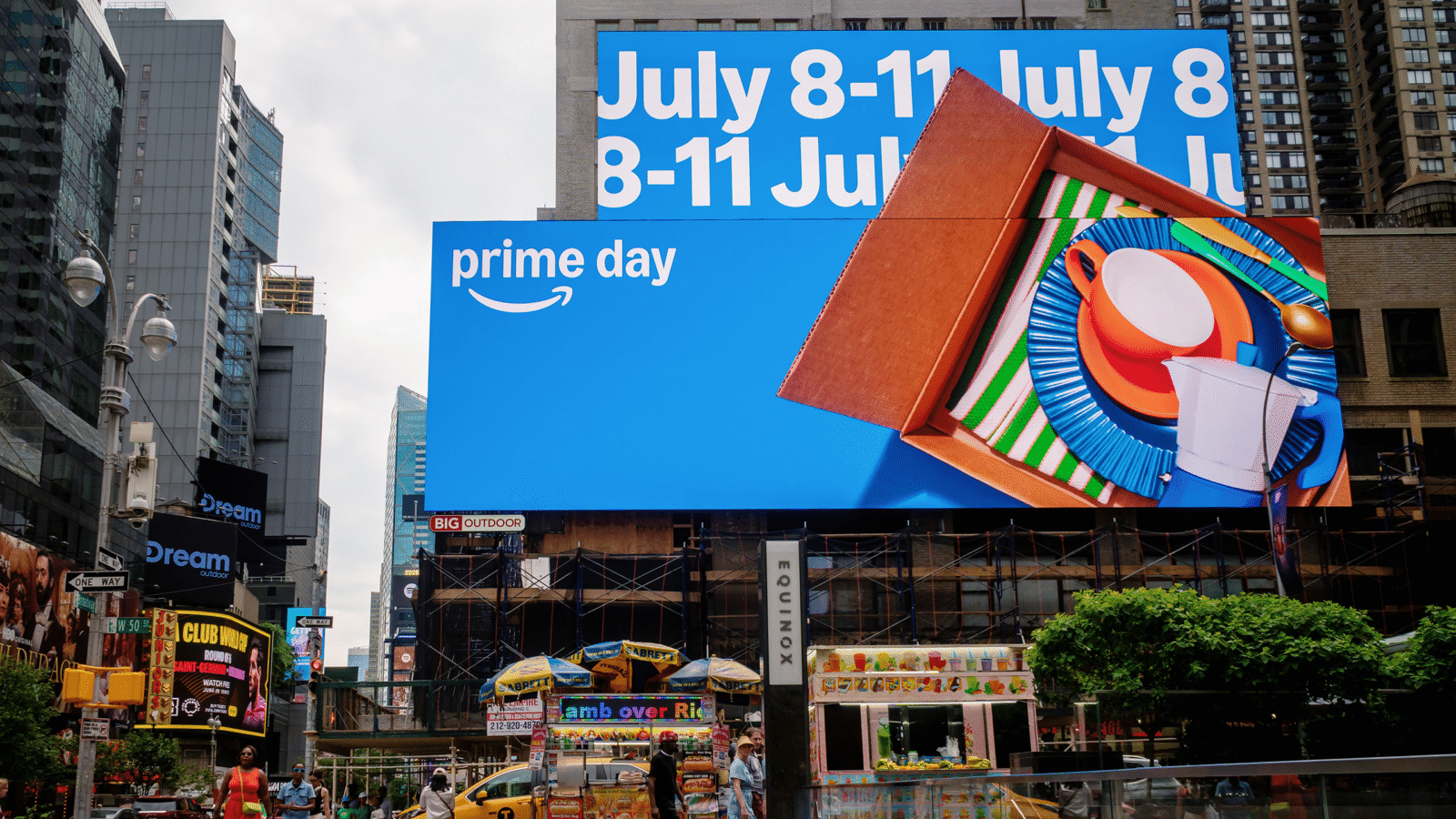Good morning.
Food giants including General Mills, Kraft Heinz, Nestlé and PepsiCo have voluntarily pledged to purge their products of synthetic dyes by the end of 2027, in cooperation with an initiative led by Health and Human Services Secretary Robert F. Kennedy Jr. One industry group, however, isn’t ready to lower its colors.
The National Confectioners Association, a trade organization that represents candy-makers, told The New York Times its members will “continue to follow regulatory guidance from the authorities,” or in other words, not necessarily change their formulas without a federal mandate. NCA member Mars, the candy-maker behind wildly colorful M&Ms and Skittles, abandoned a pledge to remove artificial dyes in 2021 and told the paper its treats are “safe to enjoy.” It appears Kennedy, a longtime environmental lawyer who spent years railing against Big Oil, has found a new sparring partner: Big Candy.
Walmart Gate-Crashes Amazon’s Annual Sales Bash

It’s not quite Christmas in July, but when the nation’s two largest retailers hold overlapping sales events, you’ve got something approximating a warm-weather Black Friday.
Starting today, Amazon and Walmart are kicking off summer deals promotions — with the former’s Prime Day event running until July 11, and the latter’s “Walmart Deals” running until July 13. History suggests that a little competition will be good not only for Walmart and Amazon, but also the retail sector as a whole.
Rising Prime Lifts All Boats
The two were bound to butt heads like this. Last summer, Walmart launched its online-only Walmart Deals event as a bit of a preemptive strike — with the promotion running a couple of weeks ahead of Amazon’s typical late-July Prime event (so as to pick off a few shoppers who had been waiting to scoop up a new vacuum). This year, Amazon bumped up its Prime event to the same week as Walmart Deals and announced in June that Prime Day would now span four days. (Launched in 2015, Prime Day has been a two-day event since 2019.)
Walmart, apparently, took Amazon’s expanded event announcement last month as something of a challenge, and days later announced that its summer deals event would last six whole days. Perhaps equally importantly, Walmart said it’d be running its promotions in its brick-and-mortar stores this year as well as on its online platform.
The result? A summer sales spectacular that’s likely to prove a blockbuster for more than just the two constantly one-upping rivals:
- According to an Adobe Analytics report published Monday, US e-commerce sales could reach as high as $23.8 billion, or the equivalent of “two Black Fridays,” during the Prime Day event this year — about $9.6 billion more than last year. In addition to Walmart, retailers including Target and Kohl’s are hosting parallel Prime Day promotions this year.
- Adobe’s estimates may even be undershooting the money-making potential. According to Bank of America analysts, the 96-hour Prime Day event could generate as much as $21 billion in gross merchandise value for Amazon alone, which would mark a full 60% increase from last year’s sales figures.
Sticker Shock: The salesapalooza likely can’t come soon enough for increasingly wary (and weary) US shoppers, who have been rattled this year by trade war woes and broader economic fears. “People are going to strike when they know the deals are hot, and that’s what Prime Days are all about,” retail analyst Bruce Winder recently told MarketWatch. The deals-off may be just as useful for the increasingly wary retailers, which are fretting about year-over-year downturns in their next quarterly reports as consumer sentiment starts to sink. “These deals are being offered to try to make some of [those potentially declining sales] up,” Forrester principal analyst Sucharita Kodali told Retail Brew.
Meet The Genius Who Invented Plastic That Dissolves In Water

The world produces 450 million metric tons of plastic waste each year. Microplastics are seeping into our oceans and food. They even show up in our bodies. So you can imagine how revolutionary a new kind of plastic that completely dissolves in water would be.
Thatʼs exactly what Timeplast has created.
The company patented a water-soluble, time-programmable plastic that vanishes without harming the environment. It has the potential to disrupt everything from water bottles to packaging, and even materials beyond plastic.
Major players are already partnering with Timeplast — they had 6,000% revenue growth in a single month.
You have until 7/31 to invest in Timeplast as it scales in its $1.3 trillion market.
TikTok’s Digital Creators Working on US Version of Almost-Banned App
Welcome to the #ForUSPage. TikTok is working on a US version of its app ahead of its scheduled ban or sale, The Information reports. The new app is expected to go live in early September, two weeks before the Department of Justice plans to boot the Beijing-hailing app from stores if it isn’t first sold to a US-based buyer.
Even after TikTok is kicked off app stores, the current app will keep working for US users until March. At that point, users would have to download the US version to access their daily digest of feng shui advice videos. But migrating TikTok’s 170 million US users to a new app won’t be as easy as slowing down a room’s energy with an area rug.
#GRWM While You Can
The US government has been procrastinating about enforcing TikTok’s ban-or-sale deadline since last April, when then-President Joe Biden signed legislation targeting the Beijing-based parent company of TikTok, ByteDance.
Granted, there were detours in the road to booting the app, despite the government’s concerns about the app’s ties to China:
- ByteDance and, separately, TikTok creators sued the US, arguing the app’s ban or forced sale would constitute a free speech violation. The Supreme Court disagreed, and the app was taken down for about 12 hours in January.
- POTUS Trump swooped in to push back the ban or sale by 75 days. When that time was up, he pushed it back two more times. But with the third deadline looming, TikTok’s fate still isn’t clear.
Now, Trump says a group is closing in on a deal to buy TikTok’s US arm and his administration will start talking it over with Chinese authorities this week.
52-Part #Storytime: It’s still unclear when regulators and users will find out how the TikTok drama ends. ByteDance has said previously that it won’t sell TikTok to anyone. Though a US version of the app might allow it to remain under ByteDance’s umbrella, The Information reports that the technical and practical hurdles to building it are high. Plus, it’s unclear whether US regulators will still see the new app as a national security threat that needs to be nixed. Other apps made by ByteDance, including Lemon8 and CapCut (which Business Insider reported is also getting a US version), could get the same scrutiny.
Invest Like A Tax Pro. For every gain you make in your investments, the IRS may take a cut. Betterment’s automated tax-saving technology helps you harvest losses, optimize asset placement and rebalance your portfolio to help you keep more of what you earn. Learn more about how Betterment can help you maximize your investment returns.**
Saudi Sovereign Wealth Fund Plans Majority Stake in $1 Billion NYC Skyscraper
According to the Council on Tall Buildings and Urban Habitat, there are 47 buildings taller than 150 meters, or 492 feet, in all of Saudi Arabia. New York City has 319.
Now, the kingdom’s Public Investment Fund (PIF) has agreed to invest in maintaining that gap with plans to take a two-thirds stake in a 1,200-foot Manhattan skyscraper development. The deal is with NYC real estate developer Related, which initially planned to build a mixed-use residential project at the site but has more recently considered an office building to capitalize on the post-pandemic return to work in America’s largest economic metropolis.
An Apple Fit for a Kingdom
The pandemic turned the solid ground under many commercial real estate investments and developments into quicksand, but signs of a rebound led some to believe the alchemy would next change their foundation into gold. Last year, office building sales in the US rose 20% to $63.6 billion, according to MSCI. While well below the half-decade before the pandemic, when sales averaged $142.9 billion per year, it was the first increase since 2021.
However, the boom in access to cheaper cash for major deals that many investors expected through Fed cuts has yet to materialize, as the central bank has not reduced interest rates at all since last year. Economic uncertainty hasn’t helped. Last month, Spencer Levine, the president of NYC commercial real estate investor and developer RAL, told Business Insider: “We have definitely seen a slowdown in transactions.” At the same time, Jim Costello, MSCI’s director of research, flagged a handful of early warning signs for the commercial real estate sector, including a 52% year-over-year drop in deal volume for hotels in April, which he said could be seen as “a bit of a canary in the coal mine.” Enter the Saudi PIF. One of the world’s largest and most prominent investors, with roughly $925 billion in assets under management, it’s one of many foreign investors that have opted to pour cash into the New York City skyline, despite the uncertainty this year:
- As part of the PIF’s deal with Related, which was first reported by The Wall Street Journal, it has already invested some $200 million in the planned development at 625 Madison Avenue, a site just a block from Central Park that the two purchased for $600 million last year. The total cost of the development is expected to reach $1 billion.
- MSCI data show that foreign investors bought a total of $2.1 billion in commercial real estate in Manhattan during the fourth quarter of 2024 and the first quarter of 2025, or five times what they purchased in the same period spanning the end of 2022 and the beginning of 2023.
Come From Away: The PIF made a 2020 debt investment in Related that it can convert into a 15% equity stake. The company is best known as the co-developer of Hudson Yards, located between Manhattan’s Chelsea and Hell’s Kitchen neighborhoods, where it has another international partner: Canadian multinational real estate firm Oxford Properties. As it happens, MSCI warned in May that Canadian firms — which it dubbed the “most dominant” source of overseas capital in US commercial real estate with close to $200 billion in deals since 2015 — have become “increasingly negative” in their sentiment amid tariff uncertainty. But judging by the PIF, they may have overstated the “absence of overseas capital.”
Extra Upside
- Pacific Premium: President Trump said Japan and South Korea, America’s sixth- and seventh-largest trading partners, will face 25% tariffs commencing August 1 if more of their companies don’t move production to the United States.
- Crashing the Party: Tesla shares tumbled over 7% Monday, the first trading day since CEO Elon Musk announced his intention of starting a new political party in the US.
- Education Is A Barrier To Crypto Adoption. That was the case when Bitcoin was trading at a few thousand and it’s the case today, at north of $100k. Grayscale has been providing education and making it easier to invest in crypto for over a decade. Start your crypto journey now.***
*** Partner
Just For Fun
Disclaimers
*This is a paid advertisement for Timeplast’s Regulation CF Offering. Please read the offering circular at invest.timeplast.com.
**Betterment is not a licensed tax advisor. Tax Loss Harvesting+ (TLH+) is not suitable for all investors. Consider your personal circumstances before deciding whether to utilize Betterment’s TLH+ feature. Investing involves risk. Performance not guaranteed.

